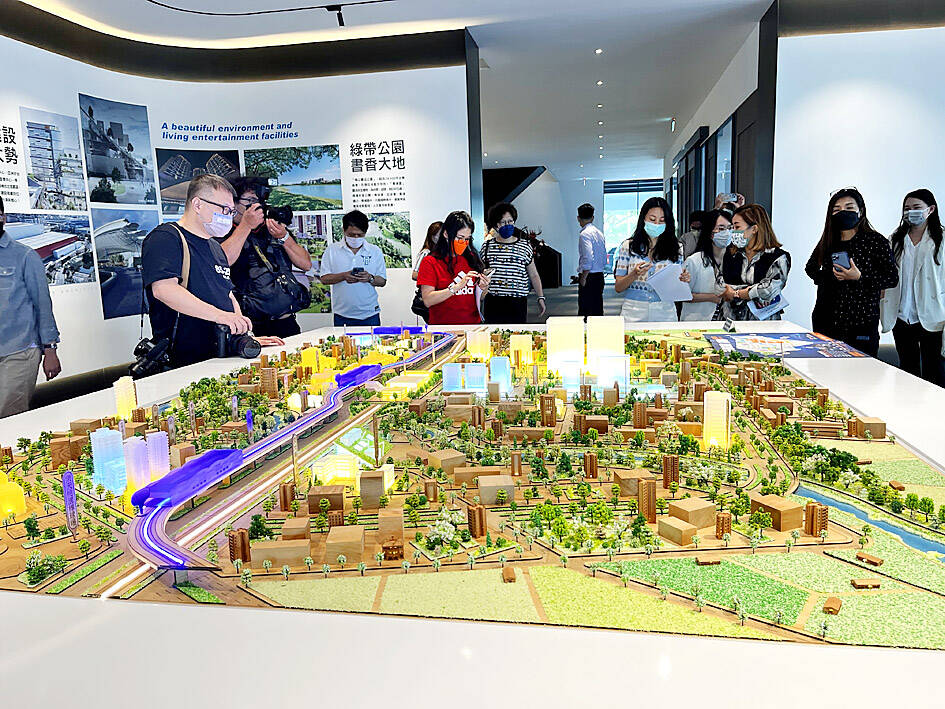Housing affordability deteriorated in the second quarter, with the mortgage burden picking up 1.27 percent to 39.62 percent nationwide, while housing prices climbed to 9.69 times household income, a survey released by the Ministry of the Interior on Sunday showed.
The uptrend in unaffordability came after median house prices in the nation rose 0.46 percent to NT$8.5 million (US$269,260) per unit from NT$8.4 million in the first quarter, while interest rates on new mortgages climbed from 1.358 percent to 1.592 percent, the ministry said.
The readings likely evolved in the same direction last quarter after the central bank last month announced another rate hike of 0.125 percentage points, while housing prices held firm amid rising building material and labor prices, it said.

Photo: Hsu Yi-ping, Taipei Times
The ministry classifies mortgage burdens of more than 50 percent of income as “extremely high,” between 40 and 50 percent as “high,” and less than 30 percent as “reasonable.”
The unaffordability reading was much sharper in Taipei, with housing prices equivalent to 16.17 times average household income and 66.12 percent of the money going to mortgage payments, the ministry said.
Housing prices amounted to 12.82 times household income in New Taipei City, with mortgage burdens taking up 52.41 percent, it said.
Mortgage burdens in Taichung climbed to 45.54 percent of household income, and constituted 38.26 percent and 38.17 percent of household income in Tainan and Kaohsiung respectively, the ministry said.
Taoyuan had a relatively reasonable mortgage burden of 32.01 percent — the lowest among the six special municipalities — as housing prices stood at 7.83 times household income, it said.
By absolute value, housing prices in Keelung, Chiayi, Yunlin and Pingtung met the reasonable test of less than 30 percent of household income, it said.
The ministry urged people to exercise caution, as long-term mortgages are vulnerable to interest rate adjustments.

Mercuries Life Insurance Co (三商美邦人壽) shares surged to a seven-month high this week after local media reported that E.Sun Financial Holding Co (玉山金控) had outbid CTBC Financial Holding Co (中信金控) in the financially strained insurer’s ongoing sale process. Shares of the mid-sized life insurer climbed 5.8 percent this week to NT$6.72, extending a nearly 18 percent rally over the past month, as investors bet on the likelihood of an impending takeover. The final round of bidding closed on Thursday, marking a critical step in the 32-year-old insurer’s search for a buyer after years of struggling to meet capital adequacy requirements. Local media reports

AI BOOST: Although Taiwan’s reliance on Chinese rare earth elements is limited, it could face indirect impacts from supply issues and price volatility, an economist said DBS Bank Ltd (星展銀行) has sharply raised its forecast for Taiwan’s economic growth this year to 5.6 percent, citing stronger-than-expected exports and investment linked to artificial intelligence (AI), as it said that the current momentum could peak soon. The acceleration of the global AI race has fueled a surge in Taiwan’s AI-related capital spending and exports of information and communications technology (ICT) products, which have been key drivers of growth this year. “We have revised our GDP forecast for Taiwan upward to 5.6 percent from 4 percent, an upgrade that mainly reflects stronger-than-expected AI-related exports and investment in the third

TECHNOLOGICAL RIVALRY: The artificial intelligence chip competition among multiple players would likely intensify over the next two years, a Quanta official said Quanta Computer Inc (廣達), which makes servers and laptops on a contract basis, yesterday said its shipments of artificial intelligence (AI) servers powered by Nvidia Corp’s GB300 chips have increased steadily since last month, should surpass those of the GB200 models this quarter. The production of GB300 servers has gone much more smoothly than that of the GB200, with shipments projected to increase sharply next month, Quanta executive vice president Mike Yang (楊麒令) said on the sidelines of a technology forum in Taipei. While orders for GB200 servers gradually decrease, the production transition between the two server models has been

ASE Technology Holding Co (日月光投控), the world’s largest integrated circuit (IC) packaging and testing supplier, yesterday announced a strategic collaboration with Analog Devices Inc (ADI), coupled with the signing of a binding memorandum of understanding. Under the agreement, ASE intends to purchase 100 percent shares of Analog Devices Sdn Bhd and acquire its manufacturing facility in Penang, Malaysia, a press release showed. The ADI Penang facility is located in the prime industrial hub of Bayan Lepas, with an area of over 680,000 square feet, it said. In addition, the two sides intend to enter into a long-term supply agreement for ASE to